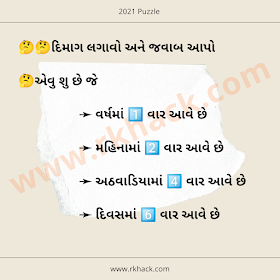Logic Puzzle With Answer
A puzzle is a game, problem, or toy that tests a person's ingenuity or knowledge. In a puzzle, the solver is expected to put pieces together in a logical way, in order to arrive at the correct or fun solution of the puzzle. There are different genres of puzzles, such as crossword puzzles,
word-search puzzles, number puzzles, relational puzzles, and logic puzzles
Puzzel 8
Puzzel 7
Answer:
20 Gheta , 5 Marghi
20 Gheta + 5 Marghi = 25 Matha
20×4 = 80 Pag, 5×2= 10 pag
80+ 10 = 90 Pag.
Puzzles are often created to be a form of entertainment but they can also arise from serious mathematical or logical problems. In such cases, their solution may be a significant contribution to mathematical research.
Puzzel 5
જવાબ – સસરા અને વહુ
Puzzel 4
Only 1% Students solved it (IAS exam)
3+5+6=151872
5+5+6=253094
5+6+7=303585
5+5+3=251573
then 9+4+7=_______?
Time to check your intellect… All the best!
So were you able to solve the riddle? Leave your answers in the comment section below.
TO CHECK ANSWER OF THIS PUZZLE Click here
Puzzel 3
25 + 13 = 38 (insert 2 in the middle) => 328
7 + 18 = 25 (insert 3 in the middle) => 235
10 + 40 = 50 (insert 4 in the middl e) => 540
Final answer: 540
Puzzel 2
Answer :
The answer is F.
1 વર્ષ માં 12 મહિના હોય: (1️⃣)
January, February, March, April, May, June, July, August, September, October, November, December
મહિના માં 4 અઠવાડિયા હોય: (2️⃣)
First, Second, Third, Fourth
અઠવાડિયા માં 7 day હોય: (4️⃣)
Firstday, Secondday, Thirdday ,Fourthday, Fifthday, Sixthday, Seventhday
દિવસ માં 24 કલાક હોય: (6️⃣)
One, Two, Three, Four, Five, Six, Seven , Eight, Nine, Ten, Eleven, Twelve, Thirteen, Fourteen, Fifteen, Sixteen, Seventeen, Eighteen, Nineteen,Twenty, Twenty-one,Twenty-two, Twenty-three, Twenty-four
Puzzel 1


Etymology
The Oxford English Dictionary dates the word puzzle (as a verb) to the end of the 16th century. Its earliest use documented in the OED was in a book titled The Voyage of Robert Dudley...to the West Indies, 1594–95, narrated by Capt. Wyatt, by himself, and by Abram Kendall, master (published circa 1595). The word later came to be used as a noun, first as an abstract noun meaning 'the state or condition of being puzzled', and later developing the meaning of 'a perplexing problem'. The OED's earliest clear citation in the sense of 'a toy that tests the player's ingenuity' is from Sir Walter Scott's 1814 novel Waverley, referring to a toy known as a "reel in a bottle".
The etymology of the verb puzzle is described by OED as "unknown"; unproven hypotheses regarding its origin include an Old English verb puslian meaning 'pick out', and a derivation of the verb pose










